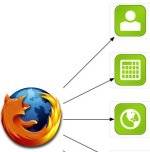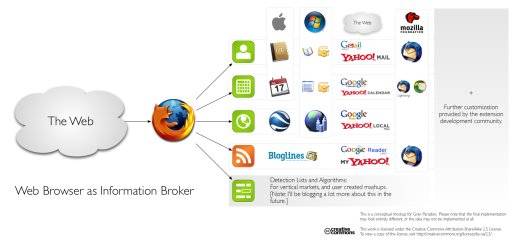Just before Christmas,
Mozilla designer Alex Faaborg published some introductory posts on his
blog about where Mozilla is headed with microformats. Quick background: Mozilla is of
course the developer of the popular open source browser Firefox; and microformats are (in
Alex’s words) “adding semantics to markup to take it from being machine
readable to being machine understandable.”

So what use would microformats be in a web browser?
Alex explains
that microformats will make the Web Browser into an “Information Broker” and suggests
that this could happen in Firefox 3. He writes:
“Much in the same way that operating systems currently associate particular file types
with specific applications, future Web browsers are likely going to associate
semantically marked up data you encounter on the Web with specific applications, either
on your system or online. This means the contact information you see on a Web site
will be associated with your favorite contacts application, events will be associated
with your favorite calendar application, locations will be associated with your favorite
mapping application, phone numbers will be associated with your favorite VOIP
application, etc.”
(emphasis mine)
This is an excellent vision and fits perfectly into the ‘best of breed’ web apps world
that we advocate on R/WW. Instead of using the entire product suite of a Google or an MSN
or a Yahoo, you can instead use the particular apps you like most from not only big
players – but small startups too. So say I use the 30Boxes online calendar – Firefox 3
would automagically transfer any (microformatted) events data I come across while
browsing, into my 30Boxes account. And it could likewise put all my contacts into Gmail,
locations into Yahoo Maps, phone numbers into Skype, etc.
Mitchell Baker from Mozilla calls this “data-browsing” in another
post. And Alex has links to more info on Mozilla’s microformats project on this page. I particularly enjoyed
this discussion of which microformats Firefox 3 might support. Alex noted in that
post:
“Detecting information in Web pages and handing that information off to other
applications changes the role of the Web browser from being solely a HTML renderer to
being an information broker.”
As of now, there is a Firefox addon called Operator, a microformat detection
extension developed by Michael Kaply at IBM. So the seeds have started to be sowed.
If Mozilla proceeds with this goal for Firefox 3 to be a broker of information, then
that will significantly raise the stakes in the browser war again. Microsoft will surely
follow and the smaller browsers will innovate around microformats to keep ahead. And it
makes perfect sense for the web browser to do brokering, because information is so fluid
and ‘small pieces loosely joined’ these days. There’s a best of breed app for every
data type – so why not use the best app where possible?
Here’s an image from Mozilla illustrating the idea:

What do you think – is this going to change the browser game significantly?

















